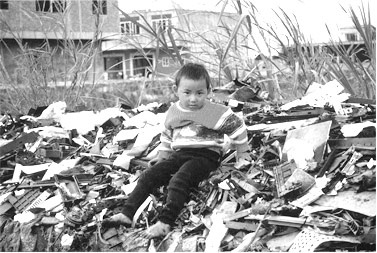|
 |
|
"Sustainable development is about "making changes to provide for the whole of the world's population while not destroying the environment"."
(ITDG, 2003)
|
|
|
 |
|
|
Why we need to change
|
|
The way we use the planet today is not sustainable. We often unwittingly cause big problems for people in other parts of the world because we are unaware of the effects that our actions have on their lives. To act sustainably, we need to take social, environmental and economic responsibility.
|

Migrant child from Hunan province sits atop one of countless piles of unrecyclable computer waste imported from around the world. Guiyu, China.
© Basel Action Network, December 2001.
|
 |
|
Taking responsibility
Life isn’t fair: 20% of the world’s population consume 82.7% of the total world income, while the poorest 20% receive only 1.4% of total world income.
|
The way we behave and the choices we make as consumers have far–reaching effects on other people and environments around the world.
There are three main factors to consider: |
 |
Social responsibility: ensuring that other people’s quality of life and human rights are not compromised to fulfil our demands – such as buying fair trade products. |
 |
Environmental responsibility: ensuring our actions and lifestyles do not have such a negative impact on the environment that the planet’s resources are being used at unsustainable rates – for example, reducing energy usage and developing renewable energy sources. |
 |
Economic responsibility: ensuring there is an economic benefit both to the region from which the purchase came and to the region in which it is marketed.
(ITDG, 2003) |
CASE STUDIES
E–waste dumping in China
|

© Basel Action Network |
 |
Countries trying to prevent pollution in their own territory are dumping e-waste from computers and electronic appliances in China.
Most of this waste is processed in large-scale dismantling yards, where thousands of people are paid to break up the electronic equipment by hand, using a hammer and chisel. |
Often they carry out highly polluting activities, such as the open burning of motors and wires to separate the metals from plastic insulation or housings.
Thousands of farmers are also involved in illegal, highly polluting recycling operations, such as the cooking of circuit boards, shredding and primitive smelting operations, to supplement their income and prevent their families from starving.
The real crime is not poor people trying to make a living, but the unwillingness of developed countries such as the United States and Japan to take responsibility and prevent the global dumping of their own toxic waste.
(Basal Action Network, 2004)
|
Mining of coltan in the Democratic Republic of Congo
Coltan (columbite–tantalite) is a metallic ore that can be turned into a heat–resistant powder called metallic tantalum. This powder is excellent at storing electrical charge and is used in the capacitors that control current flow in mobile phones.
About 80% of the world’s known coltan supply is found in the eastern regions of the Democratic Republic of Congo.
Coltan is mined by hand, by digging basins in streams and scrapping off the surface mud. A team can "mine" one kilo of coltan per day.
During the technology boom, the price of coltan jumped from US$65/kg to US$600/kg. At the moment, it stands at about US$100kg. A coltan miner can earn up to US$200 a month, compared to US$10 a month for an average Congolese worker.
The cost of coltan and its consequences
|
| The high price of coltan has lead to some serious social and environmental problems: |
 |
Profits from its sale are being used to fund civil wars in Rwanda, Uganda and Burundi. |
 |
Clearing the ground to make mining easier is devastating the natural habitat of the mountain gorilla. In the Kahuzi Biega National Park, the gorilla population has shrunk from 258 to 130. |
 |
Local people suffer poverty as a result of the displacement by the miners. To survive, locals are killing gorillas and selling their meat to the miners as "bush meat". The number of Eastern Lowland gorillas in eight of Congo's national parks has declined by 90% over the past five years, and only 3,000 now remain.
Source: (Cellular news, ND)
|
Millions of TVs going to landfill
"More than 5 million TVs are ditched each year in the UK, and many of these simply go to landfill. However, they contain a cocktail of materials that are potentially hazardous. Cathode Ray Tube (CRT) displays contain between 4lb and 8lb of lead and most solder used in circuit boards is lead. TVs are banned from landfills in some US states, to prevent lead leaching from equipment.
"Lead is toxic to kidneys and nervous and reproductive systems, and inhibits the mental development of young children and fetuses.
"CRTs also contain phosphor and barium. Short-term exposure to barium can cause brain swelling, muscle weakness and damage to the heart, liver and spleen (source:www.svtc.org). According to the Hazardous Waste regulations, TVs should not be disposed of in landfill."
(Holdway and Walker, 2004)
|
|
 |
BACK TO TOP
|
|
|







